Today every other organization is looking for sure-shot ways to streamline and automate their business processes and improve operational efficiency. With more connected technology than ever before, smart business leaders are looking towards enterprise mobile apps as a valuable tool to provide employees access to information and tools to do their jobs more efficiently.
This blog will walk you through the benefits of enterprise mobile application development, stages involved, potential challenges and practical ways to overcome them.
Enterprise Mobile App: Global Market Overview
Major global enterprise mobile app market players include IBM, Microsoft, Oracle, Salesforce, Apple and Google. The increasing adoption of AI, ML and IoT will drive the demand for enterprise mobile app development as companies pursue digital transformation. In 2022, the global enterprise mobile was valued at USD 23,400.00 million, and it is expected to grow to USD 47,888.00 million by 2030, with a CAGR of 21.50%[1].
What is Enterprise Mobile Application Development?
Enterprise mobile app development is the process of creating mobile applications for large companies. The users are mainly the organization’s employees and the goal is to improve employee productivity and streamline business operations. One of the major benefits of enterprise mobile app development is increased productivity because with the right app your employees can obtain important information on the go. Modern enterprise mobile apps leverage AI, Machine Learning (ML), Natural Language Processing (NLP) to make these apps personalized, intelligent and help businesses further improve efficiency.
Why Does Your Business Need a Modern Enterprise Mobile Application?
Modern enterprise mobile applications enable real-time decision making, enhance productivity, flexibility, and agility which is key to success in Industry 4.0. As a gateway to digital transformation, modern enterprise mobile applications leverage new technologies such as AI, IoT, ML, and others to helps businesses be more efficient, productive, and responsive while providing a better customer experience and creating a competitive edge.
Enterprise Mobile applications can provide real-time access to critical business information, enabling employees to make informed decisions quickly.
By leveraging modern enterprise mobile apps, businesses can improve operations, serve their customers better, and ultimately achieve their business objectives.
Benefits of Enterprise Mobile Application Development
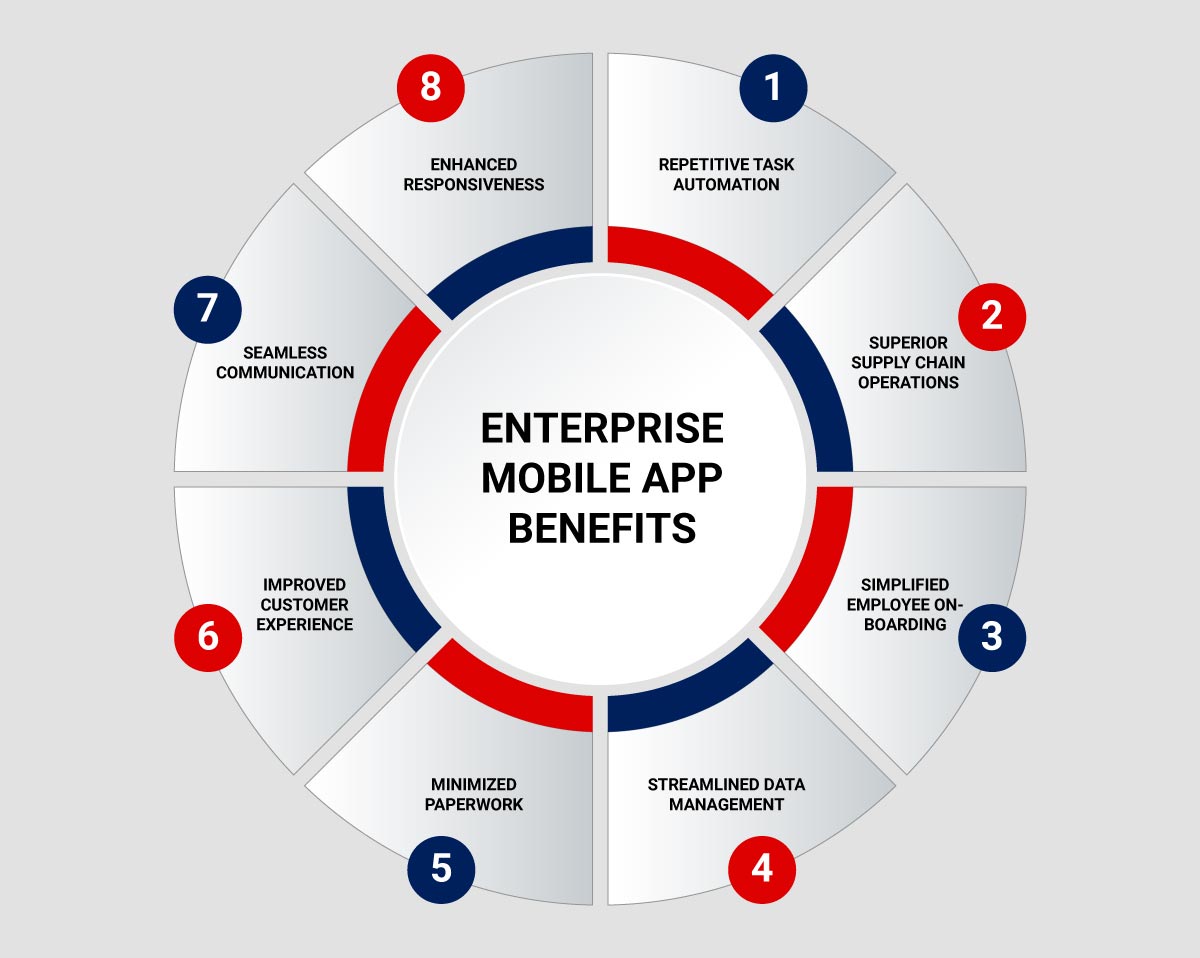
Improving collaboration, productivity and profits through automation is the primary driver for integrating enterprise mobile applications into business processes. The mobile app space offers a range of essential benefits such as top-notch security, seamless portability, and compatibility with other apps and devices. Let’s explore the advantages in-detail.
Automation of Repetitive Manual Tasks
Enterprise mobile applications can automate tedious and time-consuming tasks such as data entry and report generation. This can improve productivity and reduce errors, enabling greater capacity to focus on strategic tasks and long-term goals.
Superior Supply Chain Operations
Companies can streamline their supply chain operations with real-time data about inventory levels, order status, and delivery schedules. This level of visibility helps improve your order fulfillment process while reducing delays and errors.
Simplified Employee Onboarding Process
Human resource enterprise apps simplify the induction process for new employees by automating many of the tasks involved in onboarding new employees. By providing self-service options and easy access to important organization information and training materials, enterprise mobile apps help the HR dept save time and resources while helping improve the onboarding experience for new employees.
Streamlined Data Management
Enterprise mobile applications can automate tasks and automate manual data entry which helps reduce manual errors, improve efficiency and streamline data management. As a unified platform for collecting, storing, and analyzing data, it provides employees with real-time access to data. It further simplifies data sharing, which helps improve productivity and resolve issues quickly. Thus, with access to accurate and real-time reports, organizations can make informed decisions based on current information.
Minimized Paperwork
Apps minimize paperwork by automating tasks and providing digital forms and documents that can be filled out and signed electronically. It helps companies reduce paper waste and manual errors while maximizing efficiency.
Improved Customer Experience
Businesses across industries can enhance customer experience by enabling instant access to product information, easy ordering, and prompt support. This can help build stronger customer relationships and improve loyalty.
Seamless Communication
Enterprise mobile apps can improve communication between employees, departments, and customers. This can help companies collaborate more effectively, resolve issues quickly, and provide better service.
Enhanced Responsiveness
Enterprise mobile applications can improve responsiveness by providing real-time alerts and notifications, enabling employees to respond quickly to customer inquiries or issues. It can help companies improve customer satisfaction and reduce downtime.
With these undeniable advantages in mind, let’s now delve into different types of mobile app and their potential to reshape different aspects of your enterprise.
Enterprise Mobile Application Types
In today’s digital age, selecting the right enterprise mobile application type can significantly impact the success and efficiency of your business operations. The versatile world of mobile apps offers a myriad of choices, each designed to cater to distinct business needs. Whether you want to streamline sales processes, enhance customer engagement, optimize internal communication, or improve productivity, there’s a mobile app type suited for your specific objectives. Some of the most common types of enterprise mobile applications are:
- Client-Facing Apps: These apps help in enhancing the customer experience by providing easy access to consumer information, order placement, and support services. Examples include mobile banking, retail, and food ordering and delivery apps.
- Field Service Apps: These applications are designed to improve the productivity of field service employees by enabling real-time access to customer information, schedules, and service history. Examples include inspection apps and maintenance scheduling apps.
- Marketing Automation Apps: Simplify marketing tasks such as lead generation, campaign management, and customer segmentation with these applications. Examples include social media management apps and email marketing apps.
- ERP (Enterprise Resource Planning) Apps: Streamline business processes such as finance, procurement, human resources, and supply chain. Examples include accounting apps and inventory management apps.
- CRM (Customer Relationship Management) Apps: These applications help manage customer relationships and improve customer engagement. Examples include sales force automation apps and customer support portals.
- Supply Chain Management (SCM) Apps: Manage the entire supply chain process, from procurement to delivery with these apps. Examples include logistics management apps and warehouse management apps.
- Collaboration Apps: Improve communication and collaboration among employees, departments, and partners with these collaboration apps. Examples include team collaboration like – Slack, Jira, Asana, Monday.com, etc.
- Financial Management Apps: Efficiently handle financial operations such as accounting, budgeting, and payroll with these apps. Examples include expense management apps and tax preparation apps.
Top Enterprise Mobile App Development Trends
While there are a lot of new trends emerging in the dynamic enterprise app development landscape, here are major enterprise mobile app development trends that we picked after comprehensive, fact-based research:
- Artificial Intelligence and Machine Learning (AI/ML): AI and ML technologies improve user experiences across various business domains, such as HR, marketing, operations, and finance. They enable personalized content, chatbots for enhanced customer service, and task automation to boost operational efficiency.
- Blockchain Technology: Blockchain bolsters data security and transparency in enterprise mobile app development, particularly in sectors like finance and healthcare. It enhances trust and safety by securing transactions and data sharing in mobile apps.
- Embracing the Metaverse: The Metaverse concept is gaining traction in enterprise mobile application development, offering more immersive experiences for employees and customers. Users can seamlessly switch between experiences and access multiple services in one place. Keep an eye on industry leaders like Meta and Microsoft, who are expected to introduce exciting developments in 2023.
- Augmented Reality (AR) and Virtual Reality (VR): AR and VR technologies create immersive and interactive enterprise mobile apps. These apps are ideal for training, remote collaboration, and visualization, ultimately boosting user engagement and productivity.
- Low-Code and No-Code Development: Low-code and no-code platforms simplify mobile app development, making it accessible to non-technical users. This trend reduces development time, enabling faster implementation of new ideas in the market.
Ready to Unlock the Power of Low-Code Development for Building Enterprise-Ready Apps? Dive into Our Comprehensive Low-Code Development Guide.
Must-Have Features for Your Enterprise Mobile App
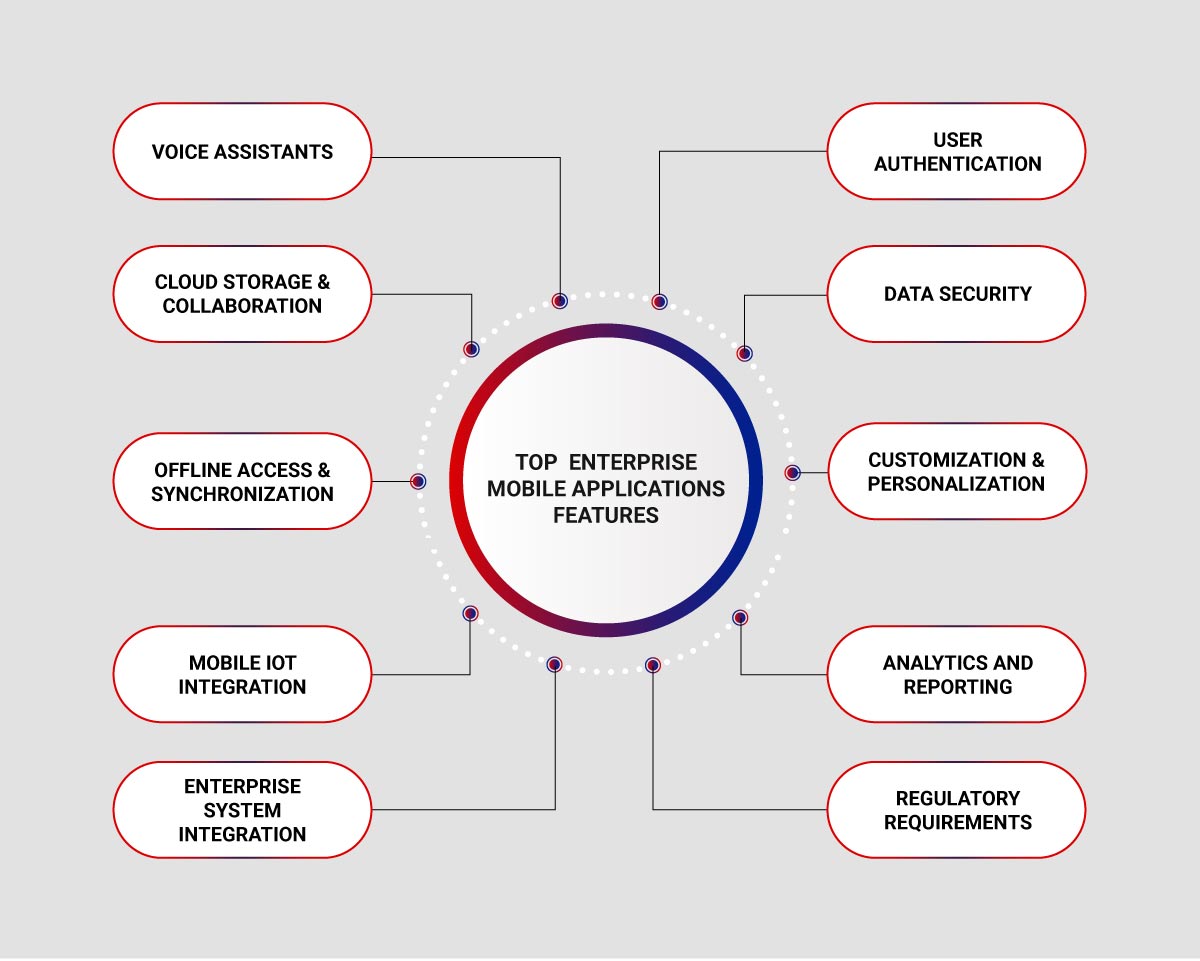
We’ve compiled a list of core features that modern enterprise mobile apps must have to meet the specific needs of businesses and their employees:
- Voice Assistants: Voice assistants provide a more natural and intuitive user experience and make enterprise mobile apps more accessible to employees than traditional text-based interfaces.
- Cloud-Based Storage and Collaboration: Cloud-based storage and collaboration features can improve productivity and efficiency while facilitating remote work.
- Offline Access and Synchronization: Provide offline access and synchronization capabilities to ensure that employees can continue to work even when they don’t have an internet connection.
- Mobile IoT Integration: Mobile IoT applications enable users to monitor device and sensor readings, view live video footage, analyze data, generate reports, manage devices, and perform various other actions. These apps are equally beneficial for customer-focused solutions, such as wearables and smart home appliances, as well as enterprise-grade management, such as hospital & care facilities, retail, and autonomous cars. Mobile IoT applications serve as a central interface for human interaction with intelligent systems. For example, a mobile app to track hospital inventory with control sensors would enable service staff to locate hospital assets and even track drug inventory via mobile applications to receive real-time information and procure them appropriately.
- Integration Capability with Enterprise Systems: Enterprise mobile apps must offer seamless integration with enterprise systems, such as ERP, CRM, and HRM, to ensure data accuracy and consistency. It helps make better data-driven decisions and deliver increased efficiency for business.
- User Authentication and Access Control: Enterprise mobile apps often contain sensitive information. Robust user authentication ensures that only authorized users can access sensitive business data. Implementing user authentication helps maintain the confidentiality and privacy of both company and customers and meet regulatory compliance.
- Data Security and Encryption: Enterprise mobile apps contain business-sensitive information such as customer information, confidential financial data records, and intellectual property. Data security and encryption measures safeguard business sensitive data from unauthorized access and prevent the risk of data breaches and cyber-attacks.
- Customization and Personalization: Employees can customize their enterprise app experience to their preferences, roles, and responsibilities. It leads to higher productivity because employees have easy access to the tools and information they usually use to make better decisions.
- Push Notifications: Push notifications are helpful to trigger task reminders and alerts to employees about important events, updates, and tasks.
- Analytics and Reporting: Analytics and reporting capabilities enable managers and administrators to track app usage, performance, and user engagement.
- Meeting Compliance and Regulatory Requirements: Enterprise mobile apps must comply with relevant regulatory and compliance requirements, such as GDPR, HIPAA, and PCI-DSS.
Challenges in Developing Enterprise Mobile Applications and Their Solutions
- Platform Diversity: Developing for multiple enterprise mobile application development platforms (such as iOS, Android, and Windows) ensures the app has a wider user reach across the organization. Having a platform-diverse app not only gives businesses more flexibility in the mobile strategy but also penetrate international markets to reach a broader audience.
Solution – To streamline and speed up development across platforms, you can leverage cross-platform development tools like Flutter or React Native. - Security Concerns: It’s crucial to ensure the security of sensitive business data and confidential consumer information as mobile apps are highly susceptible to various security threats.
Solution – Implement robust encryption, use secure APIs, and conduct regular security audits to protect sensitive data. - Integration with Legacy Systems: Many enterprises rely on legacy systems, and integrating new mobile apps with these older technologies can be challenging.
Solution – Develop APIs or middleware that bridge the gap between new mobile apps and legacy systems. - Performance Optimization: Mobile apps must run smoothly, load quickly, and consume minimal device resources to provide a positive user experience.
Solution – Continuously optimize code and assets to improve app performance. Utilize caching and asynchronous operations where possible. - Testing and Quality Assurance: Comprehensive testing across various devices, operating systems, and network conditions is time-consuming but essential for a bug-free app.
Solution – Use automated testing tools and services to streamline testing on various devices and network conditions. Implement a robust QA process. - Budget and Resource Constraints: Balancing development costs and resources with the desired app features can be a constant challenge for enterprises.
Solution – Prioritize features and allocate resources efficiently. Consider phased development to manage costs. - Data Synchronization: Managing data synchronization between the mobile app and the backend systems can be complex, especially in offline or occasionally connected scenarios.
Solution – Implement data synchronization techniques, such as offline storage and real-time data sync, to ensure consistent data access.
Essential Consideration for Enterprise App Development
Before you embark on your enterprise app development project, let us walk you through important factors and best practices to build a successful app covering all the aspects.
Business Objectives
When developing a mobile app for your enterprise, it’s essential to clearly understand the goals and purpose behind building that app. To maximize its effectiveness, keep these key points in mind.
- Figure out your goals
- Who will use the app, and why?
- What kind of app does your business need?
- How does it help your current goals?
These will help align your enterprise mobile app project with your organization’s goals.
Budget and Timeline
In enterprise mobile app development, maintaining a careful balance between budget and timeline is essential. You need to ensure a well-structured budget by estimating your overall project costs, resource allocation, scope control, and consider potential returns on investment. Simultaneously, you must manage the timeline by setting clear project phases, milestones, and resource availability. Allow adequate time for testing, user adoption strategies, and post-launch activities. Striking the right equilibrium between budget and timeline is crucial for achieving project goals while efficiently utilizing resources and adhering to deadlines.
Security
Introducing enterprise apps to your employees’ mobile devices entails potential risks to corporate data. Be alert about security issues and ensure your system is completely secure. Employees should be able to securely log in to the app store and transfer data without risking sensitive corporate information.
Integration with Other Applications
Determine whether integrating your enterprise mobile app with other applications is necessary. You may need to connect it with tools your employees already use, such as CRM systems like HubSpot or Salesforce. This decision should be made upfront.
Right Platform Selection
Determine the platforms on which your enterprise application will function and strategize your development approach accordingly. When your workforce utilizes the application on a variety of devices, consider cross-platform mobile development to assure seamless compatibility across diverse devices and platforms.
Administration and Control
Effective administration and control are crucial in managing enterprise mobile apps. This includes overseeing user access, permissions, and data security, as well as monitoring app performance and compliance with company policies and regulations. A well-structured administration and control framework ensures that the app remains secure and aligned with business objectives.
Stages of Enterprise Mobile Application Development
The enterprise mobile app development process follows a highly structured roadmap. It defines multiple stages for designing, developing, and deploying mobile applications that cater to your unique requirements. The following is a standard outline of the enterprise mobile app development process.
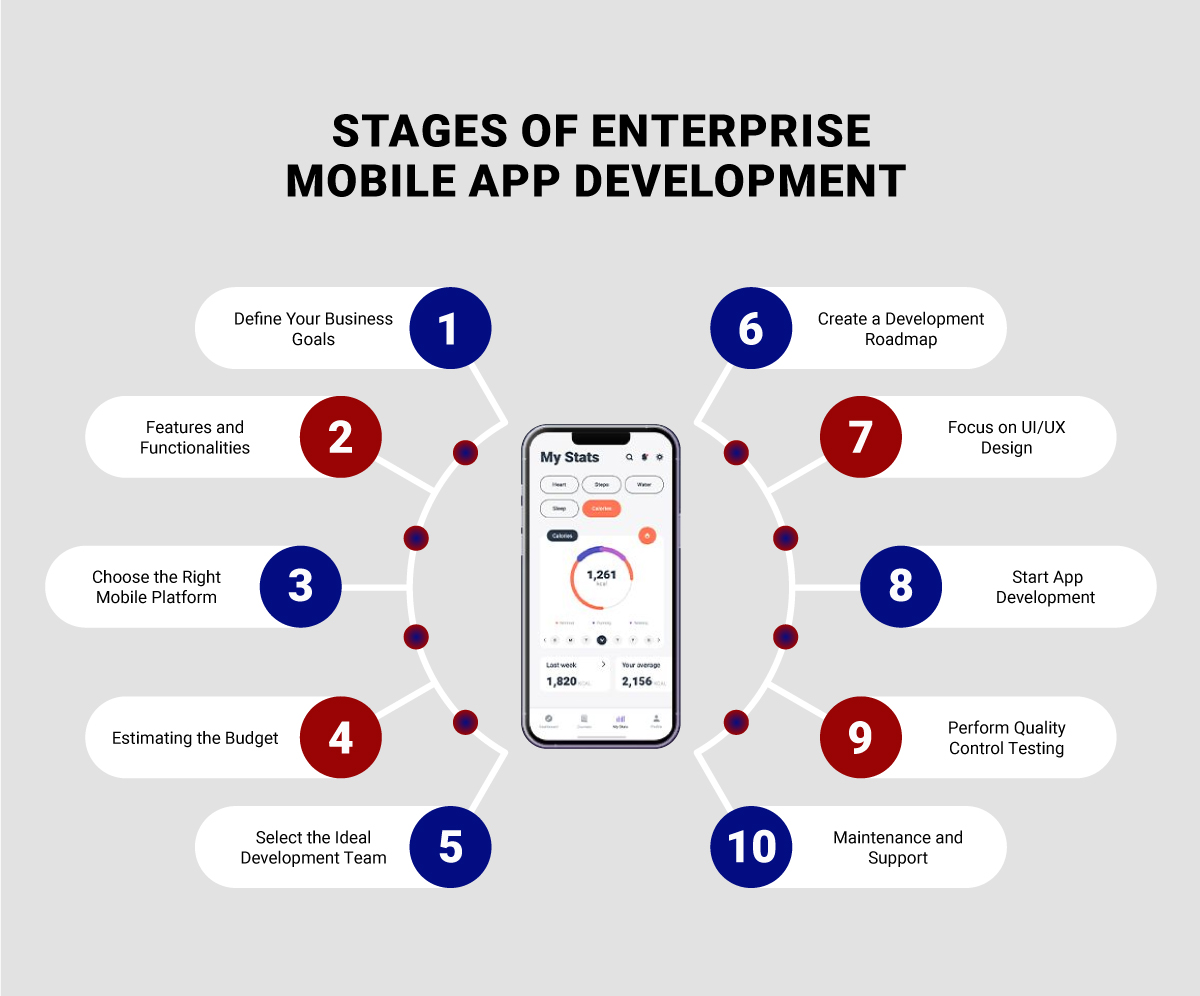
1) Define Your Business Goals
Every business activity or project is always associated with its goals. Before initiating the development, keeping your project focused on your organization’s goals is essential to ensure your app boosts revenue. Spend some time outlining your objectives in detail. This will help you create a list of crucial features for your app.
2) Features and Functionalities
Based on the goals defined, estimate the features and functionalities you want to include in the application. This step is crucial for the success of your mobile app.
3) Choose the Right Mobile Platform
When developing a user-focused enterprise mobile app, consider the target audience and their mobile platform preferences, whether iPhone or Android. This evaluation will guide your decision on developing a cross-platform app or a single platform. You also need to consider various other technical factors, such as,
- Programming languages
- Development frameworks
- And design principles
This detailed consideration will help you to make an informed decision that aligns with the needs of your target audience and your development team.
4) Estimating the Budget
By now, you should have a clear picture of your app’s objectives and feature list. It’s essential to do comprehensive research and collect cost estimates from a skilled mobile app development services provider. This will assist you in recognizing potential expenses making sure resources for development, design, testing, and deployment are used efficiently. This method lets you make informed decisions and establish a clear budget plan.
5) Select the Ideal Development Team
Hire or work with a dedicated and trustworthy mobile app development company, who adhere to your business objectives. Pay attention to the questions they ask.
6) Create a Development Roadmap
Once you have selected your dream team, create a software development roadmap to move your team forward in the right direction. The product team will convert your vision into a result-driven blueprint to guide the team throughout the entire enterprise mobile app development process.
The development roadmap will contain:
- Mobile app architecture
- Major milestones
- Project tasks and assignees
- Software and hardware specifications.
It simply provides an overview of the app’s layout, functionality, and user interaction and ensures tasks are completed on time.
7) Focus on UI/UX Design
Engaging user interface (UI) and user experience (UX) designs are crucial for any application. An attractive interface draws users in, while a user-friendly design keeps them engaged. Work with your dedicated team to create workflow diagrams that include minimalist yet impactful and all the necessary user interactions.
8) Start Enterprise App Development
The development phase involves writing the actual code for the app. It consists of three parts – Front-end development, Back-end/server technology, and Application programming interface (API).
The development team works closely with you during this stage to deal with the technical stuff. They are experts at handling technical details like setting up databases, connecting different parts of the app, and ensuring all the features work just as planned in the design.
9) Perform Quality Control Testing
Ensure the stability and security of your app through thorough quality assurance (QA) testing during development. Involve the QA team during the planning and design phases to help them understand the app’s goals and functional requirements, enabling precise testing.
10) Maintenance and Support
After launching your enterprise app, ongoing maintenance is necessary to fix issues, address crashes, update features, and keep the app compatible with the latest devices and OS versions. Your development team should be ready to make improvements and remove mistakes.
How Rishabh Software Can Help You Develop a Mobile App For Your Enterprise?
When you choose us as your trusted enterprise mobile app development services partner, you can rest assured of our high-standard mobile programming and creativity for enabling seamless user experience across all platforms and devices. We are known for offering end-to-end full-cycle mobile app development, right from ideation to design and integration to management services, to offer a transformative enterprise-class solution.
As a result-oriented cross-platform mobile app development company, we have successfully helped businesses across industries to build enterprise mobile apps – from retail, media & entertainment to healthcare, fintech & more. Our team is well-versed with top cross-platform frameworks like Flutter, Xamarin, and React Native.
Success Stories
Field Sales Management Mobile App Development

A business & technology solutions provider wanted to streamline sales force initiatives. They sought to get visibility into field sales operations.
We developed a unified field sales management mobile app that enabled sales teams to build & nurture customer relationships within their network.
Key Benefits Delivered
- 43% improvement in sales prospecting and forecasting
- 2x faster deal closures
- 4x improvement in performance and reliability
Read more about how the field sales management mobile app helped the US-based business and technology solutions provider to boost productivity and maximize revenues.
Gas Cylinder Distribution & Tracking System
A prominent gas supplier sought to optimize its supply chain network and gain more control over stock levels. They wanted to monitor the movement of cylinders & vehicles between the plant & refilling depot efficiently.
We helped digitize the process with a dedicated mobile app to digitally control the end-to-end gas supply process. From picking up the order to delivery and returning to the plant, for which a manual assignment was in place previously.
Key Benefits Delivered
- 40% faster delivery process
- 46% clarity in order workflow & inventory control
- 4x increase in driver proficiency to manage multiple orders
Read more about how the gas cylinder distribution & tracking system helped the French gas distribution company to boost the supply chain efficiency.
We understand that every enterprise has its challenges, goals, and customer expectations, so we work closely with our clients to develop custom solutions tailored to their needs.
Frequently Asked Questions
Q: How enterprise mobile apps are different from apps for startups?
A: Enterprise mobile apps are designed for established businesses, focusing on complex workflows, scalability, and adherence to regulations. They have larger budgets and cater to a controlled user base. In contrast, apps for startups prioritize rapid growth, innovation, and user acquisition, often with limited resources and a focus on market traction.
Q: How to secure your enterprise mobile app?
A: To secure your enterprise mobile app, you can start by implementing substantial data encryption, robust authentication, and authorization mechanisms to secure your enterprise mobile app. Regularly update the app and its backend, conduct security audits, and educate users about best practices. Ensure compliance with data privacy regulations and have an incident response plan. Monitoring, logging, and remote wipe capabilities are essential for proactive security.
Footnotes:
1 – https://www.databridgemarketresearch.com/reports/global-mobile-enterprise-application-market



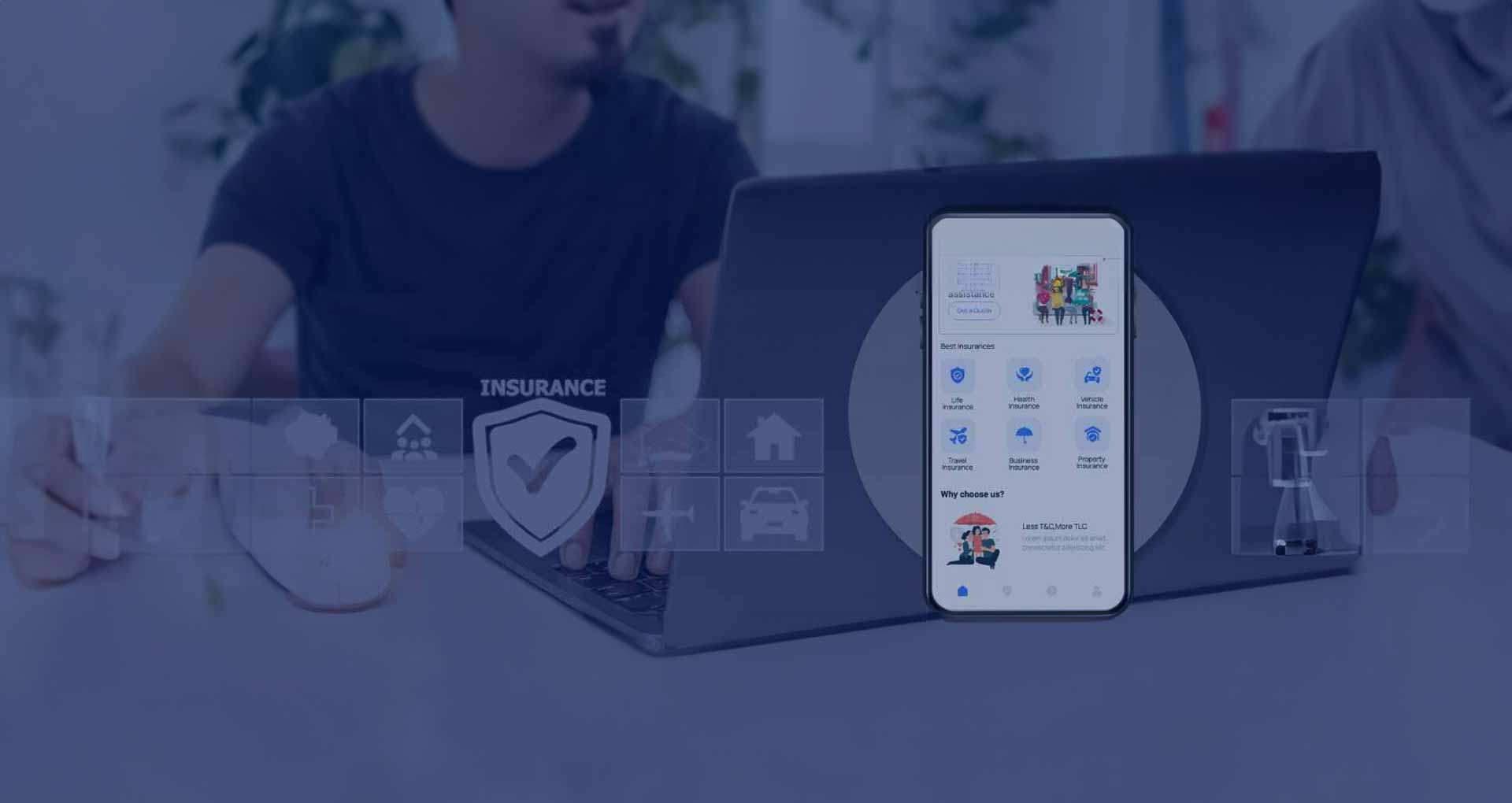
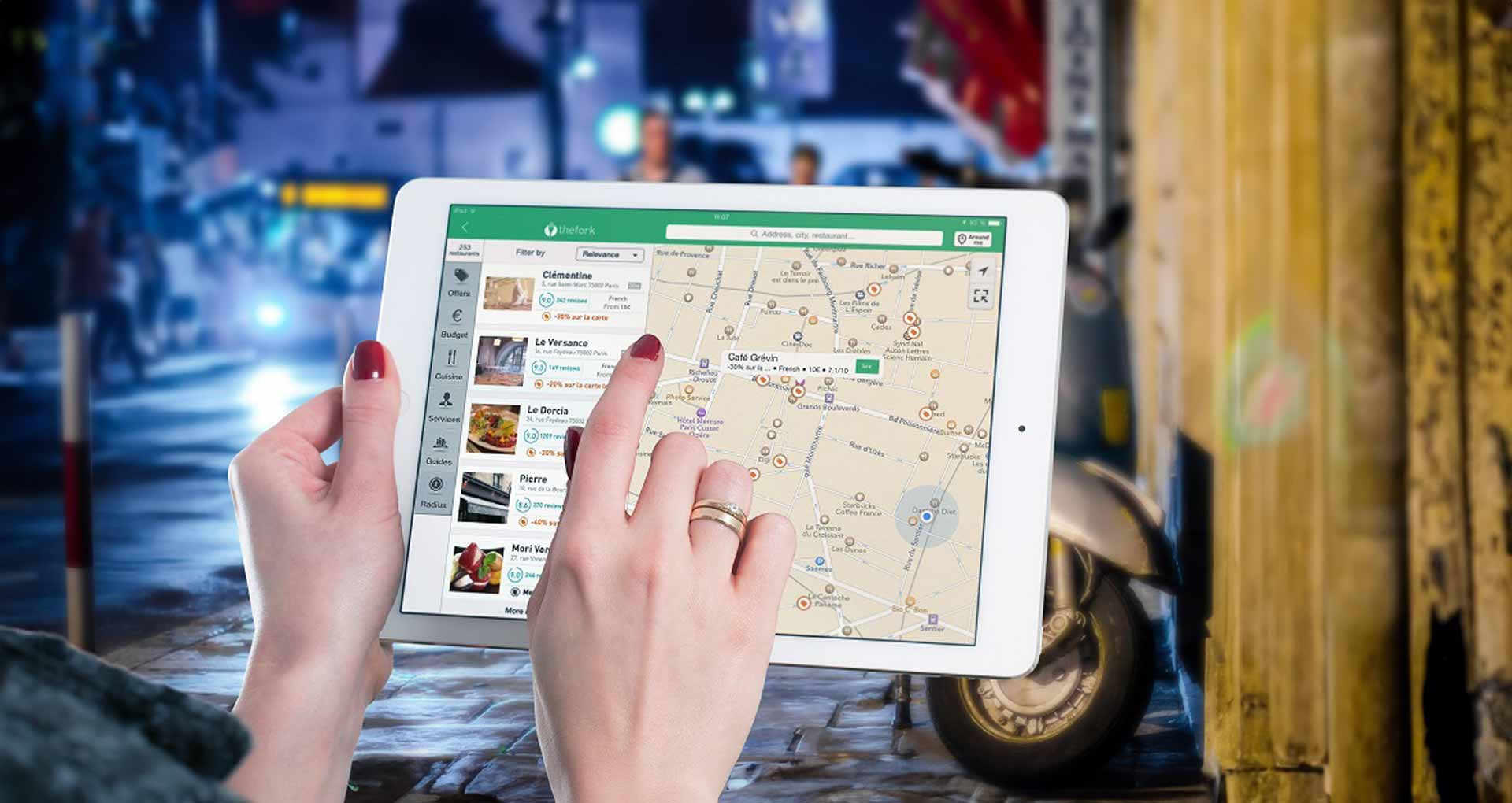
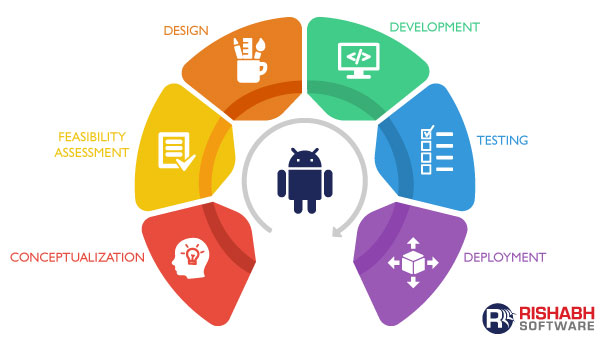





 30 Min
30 Min


